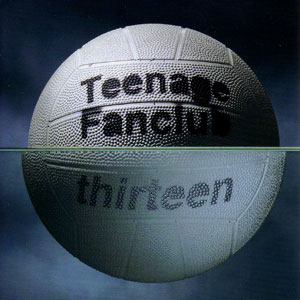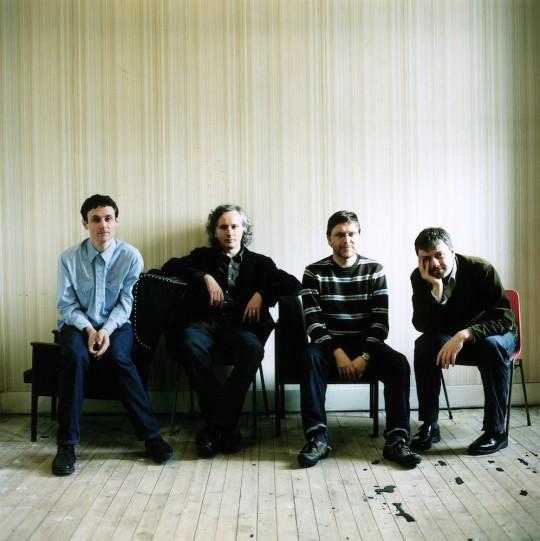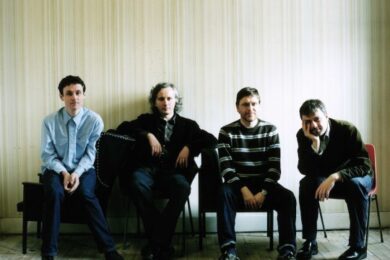At 20 years, the survival rate for pop groups must come perilously close to zero. And this is especially if by ‘survival’ we means more than the same musicians playing the same music to the same audiences. This denies continuing artistic adaptation with the sustained possibility of attracting fans from new generations. Anything less quite often and quite rightly provokes the calls for a mercy killing, as John Strausbaugh did in his 2001 anti-Rolling Stones polemic ‘Rock ‘Til You Drop’.
Have power-pop prodigies Teenage Fanclub beaten the odds? Twenty years span their first album, A Catholic Education and their ninth, The Shadows, which was released in May 2010. Their core creative line-up remains – unperturbed by disillusionment, drugs, love quarrels or other ‘creative differences’ – bassist/vocalist Gerard Love, lead guitarist/vocalist Raymond McGinley and guitarist/vocalist Norman Blake. With each songwriter bringing his own compositions to the table, they have stayed together through multiple changes in style and direction. What is the explanation for their longevity, and was it worth it?
1. ‘Everything Flows’ – debut single (1990)
Early Man and early Teenage Fanclub were both dirtier, cruder and less articulate than what they would later become. ‘Everything Flows’ is often taken as the sole salvageable artefact from the time of the first album, A Catholic Education, when the Fanclub weren’t even Blake’s only band. Heavily indebted to Rust-era Neil Young, the song builds to a screaming, distorted climax over five minutes.
2. ‘The Ballad of John and Yoko’ – single (1990)
Teenage Fanclub brought what is perhaps the Beatles’ most specifically personal song rudely up to date with this cover version. Obviously at some pains not to be taken more seriously than they take themselves, they bulldoze through John Lennon’s words half-singing and half-chanting in unison, and then round off the winningly shambolic performance with some Spaghetti-Western catcalls.
Nobody sets out to look cool by covering The Beatles, because they’re the obvious influence common to nearly every modern indie band or musician. Strangely, Teenage Fanclub have never seemed to care about being original. Not to say they’ve been unambitious, or cheated their music of its share of blood, sweat and tears; but they have definitely worn their influences (Big Star, The Byrds, Neil Young, Orange Juice, Dinosaur Jr. etc.) firmly on their sleeve, covering songs by many of them. In a post Bandwagonesque interview, when as a young band they should have been full of piss, vinegar and righteous arrogance, they were already talking about being part of a tradition. But, unburdened of any seemly regard for originality, the band has been free to approach their lyrics from outside the ken of rock & roll’s traditional mavens, mandarins and mystics, discreetly shoving the three-minute pop song in unexpected directions.
3. Bandwagonesque – album (1991)
For the benefit of thrifty record collectors: It’s the best single volume of music the band has ever made. Every song is essential to the splendid whole; ‘The Concept’, ‘December’, ‘I Don’t Know’, ‘Star Sign’ and ‘Alcoholiday’ are merely the highlights. Retaining some of the heavy distortion of A Catholic Education, harnessed to diffusely bright new melodies, they hit upon a combination that generated three Top 20 singles in the US, and managed infamously to whisk away a prize that nobody would normally remember (Spin magazine’s album of the year for 1991) from no other record than Nirvana’s Nevermind.
In the strange and frightening world of Teenage Fanclub, Bandwagonesque is like the Prime Meridian, against which the distance travelled by all future efforts would be measured. After the Blake-dominated first album, Love’s songwriting role was greatly expanded, and Raymond McGinley took his first serious stab at original composition with the excellent, riff-driven ‘I Don’t Know’. By the time of the fourth album, Thirteen, McGinley, Blake and Love had settled indefinitely on contributing an exact, egalitarian third of new material each, an uncommon working relationship that continues to flourish.
4. ‘Gene Clark’ – album track from Thirteen (1993)
For a few of their early years, the band got into the practice of closing their albums with strikingly unusual, almost experimental compositions (beginning with the instrumental ‘Is This Music’ on Bandwagonesque). For their fourth album, Thirteen, Love composed ‘Gene Clark’, a song named after the former member and primary songwriter for Fanclub touchstone influence The Byrds, who had died young in 1991. It is a musical epitaph that is too beatific to be truly morbid. The song begins with a steady, balefully melodic guitar solo. Some three minutes and a couple of verses later, the chorus: "Oh sleep, sleep/ And lay your white body down" is basically rest in peace, rephrased. Although an open admission of indebtedness to another band (“No matter what we do/It all returns to you”), ‘Gene Clark’ is nonetheless a high point of innovation and expressive power.

5. ‘Sparky’s Dream’ – single (1995)
By 1995’s Grand Prix, Teenage Fanclub had put their followers on a distortion-free diet. Far from being less fun than low-fat yoghurt, their power as an instrumental outfit had redoubled. Although lacking in some essential roughage in parts, the new standard of musicianship in the band’s sound was undoubtedly more potent stuff. ‘Sparky’s Dream’ was a chief beneficiary of this change in musical direction. Possibly there is formal musical terminology to express this better, but ‘Sparky’s Dream’ is all up. It never stops ascending. Even where pop songs usually calm down, in the bridges and buffers between the major melodic attacks of verses and choruses, there is no break in the skywards gradient. In some genres this might be more common, but pure pop onslaughts as unrelenting as this one are rare and exhilarating in indie rock.
6. ‘The Shadows’ – B-side (1995)
The Beatles started doing it with ‘Rain’, and never looked back. With ‘Acquiesce’, Oasis thought they were doing the same, and were only half wrong. You know that a band is really hitting their stride when they start throwing away fantastic songs on B-sides, in this case to back the ‘Neil Jung’ single. On the face of it, ‘The Shadows’ combines Grand Prix’s signature musical punch with the novel addition of a harmonica played at the ‘boxcar hobo’ grade of sophistication. It’s difficult to parse the song’s actual meaning (the ravages of mental illness) because of the intense catchiness intruding. Ultimately, the singer’s optimism – “I think we’re going to be OK/ We’re getting stronger every day” – is founded quite firmly on compressing weeks of rejuvenative rest-cure into three minutes of glorious, stomping harp action.
7. ‘Accidental Life’ – album track, Howdy! (2000)
In Scots author Christopher Brookmyre’s crime novel and atheist polemic Not the End of the World, Teenage Fanclub fandom is one tiny, but telling, character detail associated with protagonist Steff Kennedy. Appropriately, the band themselves would record a song on their next album that seems to tackle the issue of living in a Godless universe. Following on from a chiming twin-lead guitar intro, Norman Blake grabs hold of this predicament in the very first verse, commiserating a mystery woman because her guardian angels have vanished. Instead, "there are satellites in Heaven/ Watching everything you do". The singer shares in her grief at finding herself in a secular world less meaningful than she thought, but also offers the possibility of a positive forward direction in greater human inter-connection.

8. ‘Ain’t That Enough’ – single (1997)
Their best-selling single from their highest-charting album, Songs from Northern Britain, ‘Ain’t That Enough’ is a vision for an Alternative Rock alternative, writ large. “Here is a sunrise, ain’t that enough/ True as a clear sky, ain’t that enough” – as far as rock & roll goes, it’s an aberration. The decades-long imperative to find something to complain about, in song, has been comprehensively violated by Teenage Fanclub over the last 10-15 years. Since the Beach Boys played ‘Wouldn’t It Be Nice’, popular music has rarely been so serene and self-possessed, so raunch-less. Yet ‘Ain’t That Enough’, as it clangs boldly into verses and choruses of to-die-for harmonies, would answer all challenges of twee-ness or self-satisfaction, in its own right if not for everything in Teenage Fanclub’s oeuvre.
9. ‘Cells’ – album track, Man Made (2005)
"The dead are stepping out tonight/ The battle’s lost without a fight" – ‘Cells’, recorded as its composer Norman Blake approached his forties, is an admission of mortality without any morbidity. Skipping along on an elegant line of acoustic guitar, the elusive little harmonies on the repeated phrase “Breaking down/ Cells, breaking down” seem to hint at the impossibility of hanging on to any one moment in time. Then, the whole affair dissolves into distortion and at 2’30” it’s all over, save for an unravelling bit of finger-picking. Glorious.
10. Shadows – album (2010)
Was it worth it?
It’s important to take stock of the present; this isn’t a Strange and Frightening History Lesson. Although that title implies an introduction for novices, it seems that a lot of these features are mainly for existing fans, people divided by geography who want to commune over their shared approbation. The comments are usually about how the readers came to love said band/person/label, or what else ought to have been included from their work. I’m not saying that I’m better than it, because it’s nice and I enjoy it too; only, you have to tell the whole story.
What set Teenage Fanclub apart was that they stopped trying to be special, and endeavoured only to be good. When everybody else was ruthlessly carving out little territories of spurious uniqueness, Teenage Fanclub did a bit of lateral thinking instead. Yes, they cannibalized Byrds and Big Star albums for ideas, but they also sang about things that might honestly matter – like fidelity, needing direction, getting old or fallen leaves – to people for whom cocaine or sex at Club 18-30 would not be priorities. And it worked; or they got an album to #3, at least.
If you ignore the incentive to be cool, however, you are inevitably more open to the possibility of being dull, which is what Shadows is. There is a kind of loveliness to it and a couple of the songs, ‘Sometimes I Don’t Have To Believe In Anything’ and ‘Into the City’, are quite splendid. On the whole, however, the album subsides into a musical and emotional monotone, particularly the vocal track, which just sounds the same regardless of who is on lead.
Similar things could be said about significant but smaller fractions of the previous two albums, too. Teenage Fanclub aren’t in decline, exactly, because decline implies a fall, which is hardly on the cards. Thanks to a longstanding, loyal fanbase, their influence on the contemporary music scene appears to be stable (the last three albums charted within four positions of each other), although quite moribund. However, in the purely artistic stakes they’re in way better shape than, say, Blondie, the Rolling Stones [No they aren’t, Ed] or the Ramones were at this stage in their careers. That, too, seems to come down to their nonchalant attitude towards posterity having stopped them from burning out years ago. We’re lucky to have Teenage Fanclub, still.



